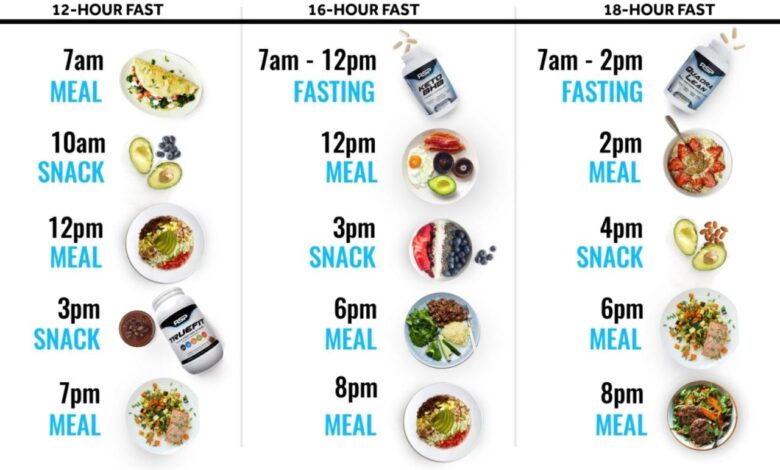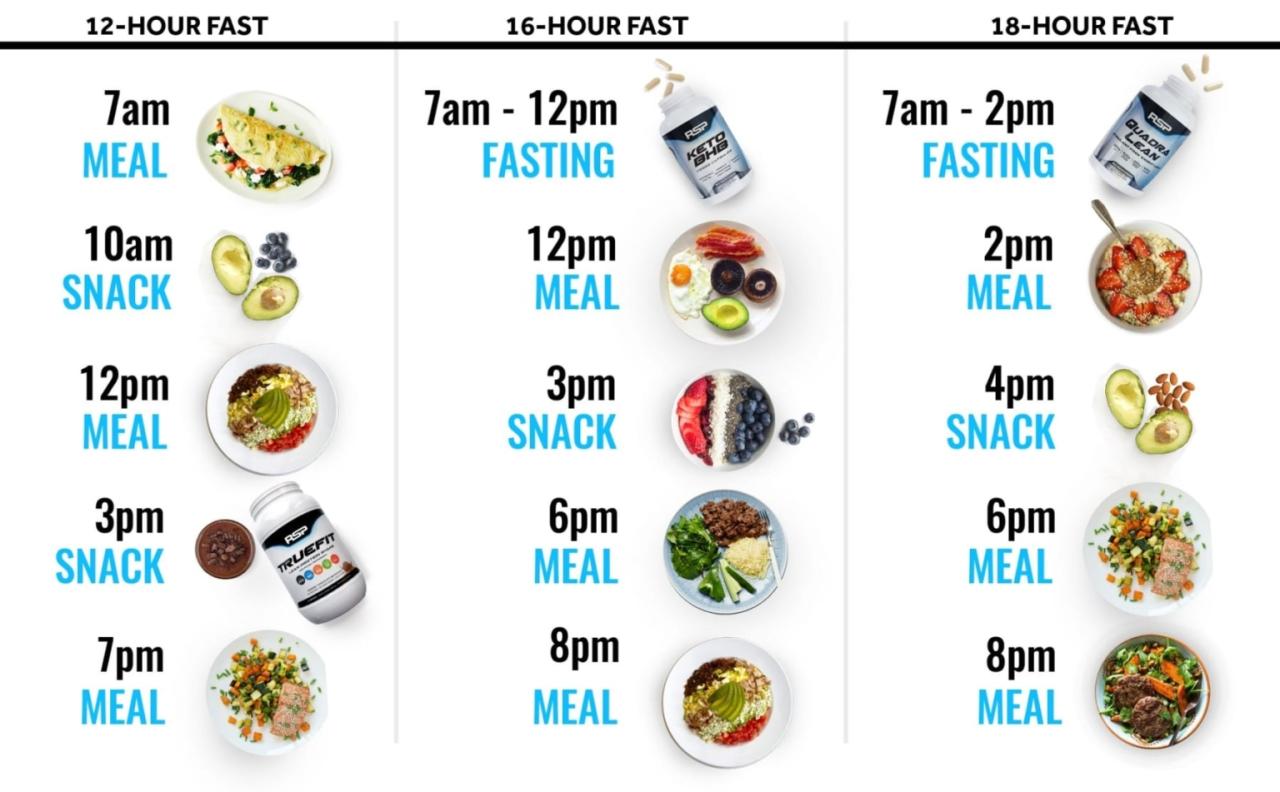
What to Know Before You Try Intermittent Fasting
What to know before you try intermittent fasting? It’s a question that’s popping up more and more as this trendy diet plan gains popularity. Intermittent fasting, or IF, involves cycling between periods of eating and fasting, rather than restricting specific foods.
It’s not a diet in the traditional sense, but rather a pattern of eating that can offer potential benefits like weight loss, improved insulin sensitivity, and even enhanced brain function. But before you dive in headfirst, it’s crucial to understand the ins and outs of intermittent fasting, its potential risks, and how to approach it safely and effectively.
This guide will explore the different methods of intermittent fasting, who it might be suitable for, and the key things to consider before embarking on this journey. We’ll delve into the potential benefits and drawbacks, discuss the importance of diet and exercise during IF, and offer practical tips for success.
Whether you’re curious about trying intermittent fasting for weight loss, overall health, or simply to explore a new way of eating, this comprehensive guide will provide you with the information you need to make an informed decision.
What is Intermittent Fasting?

Intermittent fasting (IF) is an eating pattern that cycles between periods of eating and fasting. It doesn’t specify
- what* you eat, but
- when* you eat. Unlike traditional diets that focus on restricting certain foods, IF focuses on the timing of your meals.
Instead of restricting calorie intake, IF focuses on restricting theduration* of eating. This means you alternate between periods of eating and voluntary fasting.
Types of Intermittent Fasting
Intermittent fasting has become increasingly popular in recent years, with numerous methods emerging. Some of the most common methods include:
- The 16/8 Method (also known as the “Leangains protocol”):This involves fasting for 16 hours each day and limiting your eating window to 8 hours. For example, you might eat between 12 pm and 8 pm, then fast until 12 pm the next day.
- The 5:2 Diet:This involves eating normally for 5 days a week and restricting your calorie intake to 500-600 calories on the other 2 days.
- Eat-Stop-Eat:This involves fasting for 24 hours once or twice a week. For example, you might eat dinner on Monday, then fast until dinner on Tuesday.
- Alternate-Day Fasting:This involves alternating between days of eating normally and days of fasting.
Scientific Basis and Potential Benefits
Intermittent fasting is based on the idea that periods of fasting can trigger various physiological changes that may have health benefits. Here are some of the scientific principles and potential benefits:
- Cellular Repair and Autophagy:Fasting can trigger a process called autophagy, where the body breaks down and recycles damaged cells and proteins. This process may help to protect against various diseases, including cancer and neurodegenerative disorders.
- Hormonal Changes:Fasting can lead to changes in the levels of various hormones, including insulin, growth hormone, and IGF-1. These changes may contribute to weight loss, improved insulin sensitivity, and reduced inflammation.
- Reduced Inflammation:Studies suggest that intermittent fasting can reduce inflammation, which is a key contributor to many chronic diseases.
- Improved Brain Function:Some research suggests that intermittent fasting may improve cognitive function and protect against neurodegenerative disorders.
Who Should Consider Intermittent Fasting?
Intermittent fasting, a dietary pattern that cycles between periods of eating and fasting, has gained popularity as a weight loss strategy and for its potential health benefits. While it can be a suitable approach for some individuals, it’s essential to understand who might benefit from it and who should avoid it.
Individuals Who May Benefit from Intermittent Fasting
Intermittent fasting can be a viable option for individuals seeking to improve their overall health and well-being. However, it’s crucial to remember that it’s not a one-size-fits-all approach. Here are some groups who might find intermittent fasting beneficial:
- Individuals with Obesity or Overweight: Intermittent fasting has shown promise in helping individuals lose weight and improve metabolic health. By reducing overall calorie intake, it can contribute to weight loss and reduce the risk of chronic diseases associated with obesity.
- Individuals with Type 2 Diabetes: Intermittent fasting can improve insulin sensitivity and blood sugar control in individuals with type 2 diabetes. By reducing insulin resistance, it can help regulate blood sugar levels and potentially reduce the need for medication.
- Individuals with Polycystic Ovary Syndrome (PCOS): Intermittent fasting may help improve hormonal imbalances and reduce symptoms associated with PCOS, such as weight gain, irregular periods, and acne. By promoting weight loss and reducing insulin resistance, it can help regulate hormone levels and improve overall health.
- Individuals with Cardiovascular Disease: Intermittent fasting can lower blood pressure, improve cholesterol levels, and reduce inflammation, all of which are beneficial for individuals with cardiovascular disease. However, it’s important to consult a healthcare professional before starting intermittent fasting, especially if you have a history of heart disease.
Potential Risks and Contraindications
While intermittent fasting can be beneficial for some, it’s not without risks and contraindications. It’s crucial to be aware of these potential downsides before embarking on an intermittent fasting plan:
- Nutrient Deficiencies: Prolonged fasting periods can lead to nutrient deficiencies, particularly if individuals don’t consume a balanced diet during their eating windows. It’s essential to ensure adequate intake of essential vitamins and minerals, especially during periods of fasting.
- Gastrointestinal Issues: Intermittent fasting can sometimes cause gastrointestinal issues, such as nausea, heartburn, and constipation. These symptoms are often more pronounced in individuals with pre-existing digestive conditions.
- Headaches and Fatigue: During the initial stages of intermittent fasting, individuals may experience headaches and fatigue due to the body’s adaptation to the new eating pattern. These symptoms usually subside as the body adjusts.
- Low Blood Sugar: Fasting can lead to low blood sugar levels, particularly in individuals with diabetes or those taking certain medications. It’s essential to monitor blood sugar levels closely and adjust medication accordingly.
- Muscle Loss: Prolonged fasting periods can lead to muscle loss, particularly if individuals are not engaging in regular exercise. It’s important to maintain a balanced diet and engage in strength training exercises to prevent muscle breakdown.
- Interference with Medications: Intermittent fasting can interfere with the absorption or effectiveness of certain medications. It’s essential to consult a healthcare professional before starting intermittent fasting if you are taking any medications.
- Mental Health Issues: Intermittent fasting can sometimes trigger or exacerbate mental health issues, such as anxiety and depression. It’s important to be mindful of your mental health and seek professional help if needed.
Consulting a Healthcare Professional
Before starting intermittent fasting, it’s crucial to consult a healthcare professional, particularly if you have any underlying health conditions or are taking medications. Your doctor can assess your individual needs and provide personalized guidance on whether intermittent fasting is suitable for you and how to approach it safely.
They can also help you identify potential risks and contraindications and ensure that you are taking appropriate precautions.
“It’s always a good idea to consult with your doctor before starting any new diet or exercise program, including intermittent fasting.”
Types of Intermittent Fasting Methods
Intermittent fasting is not a diet in the traditional sense but rather a pattern of eating that cycles between periods of eating and fasting. There are many different intermittent fasting methods, each with its own unique schedule and rules. Here, we’ll delve into some of the most popular methods, comparing and contrasting their effectiveness and feasibility.
Before diving into intermittent fasting, it’s crucial to understand its potential effects on your body, especially if you’re active. Just like choosing the right music can enhance your workout experience, your post-workout music can also play a big role in your recovery , intermittent fasting can impact your energy levels and ability to recover.
It’s important to listen to your body and adjust your fasting schedule accordingly to avoid any negative impacts on your performance.
The 16/8 Method, What to know before you try intermittent fasting
The 16/8 method, also known as the “Leangains protocol,” involves fasting for 16 hours each day and eating within an 8-hour window. This is one of the simplest and most popular methods. For example, you might eat between 12 pm and 8 pm and fast from 8 pm to 12 pm the next day.
The 16/8 method is often described as “time-restricted feeding” and is a convenient option for many people.
The 5:2 Method
The 5:2 method involves eating normally for five days of the week and restricting calories to 500-600 for the remaining two days. This method is flexible and allows for a “cheat day” to help maintain adherence. For example, you could fast on Mondays and Thursdays, eating normally on the other days.
Alternate-Day Fasting
Alternate-day fasting involves fasting every other day. This method is more rigorous than the 16/8 or 5:2 methods, but it can be very effective for weight loss. On fasting days, you can consume a minimal amount of calories, usually around 500.
Comparing and Contrasting the Methods
Each method has its own benefits and drawbacks. The 16/8 method is the easiest to implement and can be incorporated into most lifestyles. The 5:2 method is flexible and allows for a cheat day, making it easier to stick to.
Alternate-day fasting is the most rigorous method but can lead to the most significant weight loss. Ultimately, the best method for you will depend on your individual preferences, lifestyle, and health goals.
Intermittent Fasting and Diet
Intermittent fasting (IF) is a dietary approach that focuses on
- when* you eat, rather than
- what* you eat. While IF allows flexibility in your food choices, it’s crucial to remember that a healthy diet is still essential for optimal health and well-being.
A balanced diet rich in fruits, vegetables, lean protein, and whole grains is crucial during IF. This ensures you get the necessary nutrients and support your body’s functions.
Food Choices During Fasting and Eating Windows
It’s essential to prioritize nutrient-rich foods during your eating window. * Fasting Window:During your fasting window, focus on staying hydrated by drinking water, unsweetened tea, or black coffee. Avoid sugary drinks and calorie-rich beverages.
Eating Window During your eating window, prioritize whole, unprocessed foods:
Fruits and Vegetables Aim for a variety of colorful fruits and vegetables, providing essential vitamins, minerals, and fiber.
Lean Protein Include lean protein sources like chicken, fish, beans, lentils, tofu, and eggs to support muscle growth and satiety.
Healthy Fats Opt for healthy fats from avocados, nuts, seeds, and olive oil.
Whole Grains Choose whole grains like brown rice, quinoa, and oats over refined grains.
Impact of Intermittent Fasting on Blood Sugar and Insulin Sensitivity
Intermittent fasting can have a positive impact on blood sugar levels and insulin sensitivity. When you fast, your body starts utilizing stored glucose and fat for energy, leading to a decrease in blood sugar levels. This can improve insulin sensitivity, making your body more efficient at utilizing glucose.
Intermittent fasting can be particularly beneficial for individuals with type 2 diabetes or those at risk of developing the condition.
Before you dive into intermittent fasting, it’s essential to consider your individual needs and goals. Some people find it beneficial, while others may struggle with the adjustments. A key aspect to consider is how your eating habits affect your sleep, which can be significantly impacted by fasting periods.
For insights on how to optimize your diet for better sleep, check out this helpful article on eating for impact ways to eat for sleep. Understanding the relationship between food, sleep, and intermittent fasting can help you make informed decisions about your health journey.
By promoting insulin sensitivity, intermittent fasting can help regulate blood sugar levels and potentially reduce the risk of developing type 2 diabetes.
Potential Side Effects and Risks
Intermittent fasting, while generally considered safe for most healthy adults, can come with certain side effects and potential risks. It’s essential to be aware of these and take appropriate measures to minimize them.
Common Side Effects
Common side effects of intermittent fasting are usually mild and temporary, often subsiding as your body adapts.
- Hunger:This is the most common side effect, particularly during the fasting periods. It’s natural to feel hungry when you’re not eating, but it usually diminishes over time as your body adjusts to the fasting schedule.
- Fatigue:Some people experience fatigue, especially during the initial stages of intermittent fasting. This is often due to lower calorie intake or changes in blood sugar levels. Adequate hydration and a balanced diet can help mitigate this.
- Headaches:Headaches can occur due to dehydration or changes in blood sugar levels. Staying hydrated and consuming electrolytes can help prevent or alleviate headaches.
- Irritability:Mood swings and irritability are possible during fasting periods, particularly when blood sugar levels are low.
- Difficulty Concentrating:Some individuals may experience difficulty concentrating or brain fog, especially during the initial phases of intermittent fasting.
Potential Long-Term Risks
While intermittent fasting is generally considered safe in the short term, prolonged fasting or improper implementation can potentially lead to some long-term risks.
- Nutritional Deficiencies:If not carefully planned, intermittent fasting can lead to nutritional deficiencies, especially if it’s not combined with a balanced diet. It’s crucial to ensure you’re consuming enough essential nutrients during your eating periods.
- Gastrointestinal Issues:Some individuals may experience gastrointestinal issues like heartburn, constipation, or diarrhea, especially during the initial stages of intermittent fasting.
- Hormonal Imbalances:Prolonged fasting can potentially disrupt hormonal balance, impacting thyroid function, metabolism, and reproductive health.
- Increased Risk of Gallstones:Some studies suggest that prolonged fasting may increase the risk of gallstones, particularly in individuals with pre-existing gallstones or risk factors.
- Negative Impact on Mental Health:In some cases, prolonged fasting can negatively impact mental health, leading to anxiety, depression, or eating disorders.
Managing Potential Side Effects and Risks
Here are some tips for managing potential side effects and minimizing risks:
- Start Slowly:Begin with shorter fasting periods and gradually increase them as your body adapts.
- Hydrate Adequately:Drink plenty of water throughout the day, especially during fasting periods.
- Consume Electrolytes:Replenish electrolytes lost through sweat, particularly during exercise or hot weather.
- Eat a Balanced Diet:Focus on nutrient-rich foods during your eating periods to ensure you’re getting all the essential nutrients your body needs.
- Listen to Your Body:Pay attention to your body’s signals and adjust your fasting schedule or diet as needed. If you experience any severe or persistent side effects, consult your doctor.
Practical Tips for Success: What To Know Before You Try Intermittent Fasting

Intermittent fasting is a lifestyle change, and like any new habit, it requires a gradual transition. Starting slowly and consistently implementing strategies for managing hunger and cravings will contribute to your success.
Transitioning Gradually
It’s crucial to ease into intermittent fasting to avoid feeling overwhelmed and discouraged. Start by gradually extending your fasting window or reducing your eating window. For example, if you’re new to intermittent fasting, begin with a 12-hour fasting window, such as skipping breakfast.
Intermittent fasting isn’t just about when you eat, it’s also about what you eat. For example, you might want to rethink your pre-workout fuel. Instead of the traditional oatmeal, consider skipping it altogether and opting for a lighter, faster-digesting option, like a small amount of fruit or a protein shake.
You can find more information about skipping pre-workout oatmeal here , which can help you get the most out of your workouts during intermittent fasting.
As you get accustomed to this, gradually increase the fasting window to 14 hours, and then to 16 hours.
Managing Hunger and Cravings
During fasting periods, you may experience hunger and cravings. These are normal physiological responses, but there are effective strategies to manage them:
- Stay Hydrated:Drinking plenty of water, unsweetened tea, or black coffee can help curb hunger pangs.
- Distract Yourself:Engage in activities you enjoy, such as reading, exercising, or spending time with loved ones.
- Focus on Healthy Foods:During your eating window, prioritize nutrient-dense foods like fruits, vegetables, lean protein, and healthy fats. This helps stabilize blood sugar levels and reduce cravings.
- Listen to Your Body:Pay attention to your hunger cues and eat when you’re truly hungry. Don’t force yourself to eat if you’re not feeling hungry.
Staying Hydrated and Maintaining Energy Levels
Maintaining adequate hydration and energy levels is essential during intermittent fasting.
- Drink Plenty of Water:Aim for at least eight glasses of water per day, and more if you’re physically active or in hot weather.
- Electrolyte Support:Consider incorporating electrolyte-rich beverages, such as coconut water or sports drinks, to replenish minerals lost through sweating.
- Eat Nutrient-Dense Foods:During your eating window, focus on meals rich in protein, healthy fats, and complex carbohydrates. These provide sustained energy throughout the day.
- Prioritize Sleep:Getting enough sleep is crucial for maintaining energy levels. Aim for seven to eight hours of quality sleep per night.
Intermittent Fasting for Weight Loss
Intermittent fasting (IF) has gained popularity as a weight loss strategy, and for good reason. It involves cycling between periods of eating and fasting, rather than restricting specific foods. While IF doesn’t dictate what you eat, it can help you consume fewer calories overall, which is a key factor in weight loss.
How Intermittent Fasting Contributes to Weight Loss
Intermittent fasting can contribute to weight loss in several ways:* Calorie Restriction:By limiting the eating window, IF naturally reduces your overall calorie intake. When you eat less than you burn, your body taps into stored fat for energy, leading to weight loss.
Hormonal Changes Fasting triggers hormonal changes that promote fat burning. For example, it increases the levels of human growth hormone (HGH), which is involved in muscle growth and fat breakdown.
Insulin Sensitivity IF can improve insulin sensitivity, allowing your body to use glucose more effectively for energy. This can help reduce fat storage and improve metabolic health.
Increased Metabolism Some studies suggest that IF may temporarily boost your metabolism, leading to increased calorie expenditure even during fasting periods.
Potential Benefits of Intermittent Fasting for Fat Loss and Metabolic Health
Intermittent fasting has been linked to numerous benefits for fat loss and metabolic health:* Reduced Body Fat:Studies have shown that IF can lead to significant reductions in body weight and body fat, particularly visceral fat, which is associated with increased health risks.
Improved Insulin Sensitivity IF has been shown to improve insulin sensitivity, which is crucial for regulating blood sugar levels and preventing type 2 diabetes.
Lowered Inflammation Fasting can reduce inflammation throughout the body, which is linked to chronic diseases such as heart disease and cancer.
Improved Blood Pressure and Cholesterol IF may contribute to lower blood pressure and cholesterol levels, further reducing the risk of heart disease.
Long-Term Sustainability of Intermittent Fasting for Weight Management
While IF can be an effective weight loss tool, its long-term sustainability depends on several factors:* Individual Preferences:IF is not a one-size-fits-all approach. Some people find it easy to adapt to, while others struggle with the fasting periods.
Lifestyle Compatibility It’s crucial to choose a fasting method that fits your lifestyle and schedule.
Consistency Like any weight loss strategy, consistency is key. Sticking to your chosen IF plan long-term is crucial for achieving and maintaining weight loss.
Diet Quality IF is most effective when combined with a healthy, balanced diet that provides the necessary nutrients.
Overall Health It’s essential to consult with your doctor before starting IF, especially if you have any underlying health conditions.
Conclusive Thoughts

Intermittent fasting can be a powerful tool for improving your health and well-being, but it’s not a one-size-fits-all approach. It’s essential to understand the nuances of different methods, consider your individual needs and health status, and approach it with a balanced and informed perspective.
Remember, this guide is a starting point for your journey. Always consult with your healthcare professional before making any significant changes to your diet or lifestyle.






